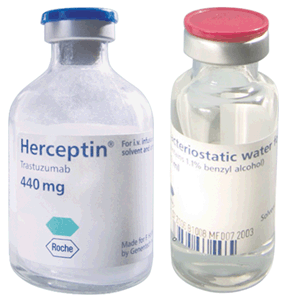 The effective breast cancer drug Herceptin can be administered in a way that greatly reduces one of its most serious side effects, a risk of heart damage, according to a study published Wednesday in the New England Journal of Medicine.
The effective breast cancer drug Herceptin can be administered in a way that greatly reduces one of its most serious side effects, a risk of heart damage, according to a study published Wednesday in the New England Journal of Medicine.
Herceptin targets a protein called Her2 which appears on the surface of the cancer cells in about one quarter of breast cancer patients. As a result of the Her2 protein, women who develop that type of cancer often have a more aggressive form. Previous studies, confirmed by the latest one, have found that if Her2 positive patients get Herceptin together with a chemotherapy drug soon after the initial surgery — called adjuvant therapy — their chance of a recurrence drops by about 50 percent. That discovery is one of the greatest successes in the history of breast cancer research.
Most doctors give Herceptin together with the familiar chemotherapy drug called adriamycin. Adriamycin by itself increases the risk for heart problems, including heart failure and even death. Combined with Herceptin, the heart risk is greater.
The latest study, of more than 3,200 women over five years, finds that if Herceptin is combined with a different chemotherapy carboplatin, used most often for ovarian cancer, the heart risk of heart failure drops more than five fold, while overall measures of heart function improve.
There is a back story to this: Dr. Dennis Slamon of UCLA’s Jonsson Comprehensive Cancer Center co-discovered the drug that became Herceptin along with scientists at Genentech, the company that now sells it. In the earliest experiments Slamon combined Herceptin with carboplatin, a chemotherapy treatment use for many types of cancer, including ovarian. But when it came time for big clinical trials, most members of the breast cancer establishment refused to test Herceptin with the ovarian cancer drug. They were far more comfortable with Adriamycin, a standard breast cancer treatment. Slamon fought for years to get the funding and permission to carry out the study that is just now being published. It could have come out long ago.
There is one drawback in this latest study. In the Herceptin-plus-carboplatin group, there were more recurrences of breast cancer. The increase was not statistically significant, but it is enough so that many doctors may not switch immediately to the new regime. Many will reserve it for patients who seem to be at particularly high risk for heart problems. Even so, the latest study offers a new option for a disease where any improvement is very welcome.
No Comments Yet